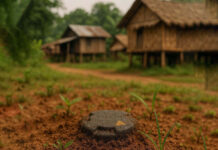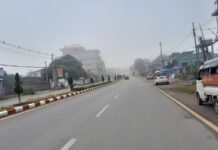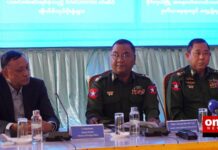[dropcap color=”#dd9933″]T[/dropcap]he news of government, parliament and the Tatmadaw deliberation meeting to find a common stand on various topics, later joined by the Ethnic Armed Organizations (EAOs) and political parties, have been making headlines recently. At the same time, the National League for Democracy (NLD) congress held lately also spelled out some of its basic commitments and realization of its election campaign promises.
The two seemingly unrelated gatherings and the policies laid down are bound to influence the function of the quasi-civilian-military government of NLD and Tatmadaw (Myanmar Army) in variety of ways, whether be it domestic or international politics.

UPDJC meeting
The preparatory meeting for the third session of the 21st Century Panglong Conference held at the National Reconciliation and Peace Center (NRPC) in Naypyitaw on June 21 to review the outcomes from the discussions held by the government, parliament, and the Tatmadaw in respective sectors have reached common ground, according to Lt-Gen Khin Zaw Oo, secretary of the Union Peace Dialogue Joint Committee (UPDJC).
“The position of the government, parliament, and the Tatmadaw agencies have been obtained after they discussed in respective sectors based on the points that were previously collected from the dialogues, points obtained from the Mon national-level political dialogue and points that were submitted from the CSO Forum,” he said, according to the Mon News Agency.
According to the State Counselor Aung San Suu Kyi Facebook, Khin Zaw Oo explained the gathered result for the sector of politics; Hla Maung Shwe economic; Zaw Htay social; and Dr Wa Wa Maung land and environment, who all belong to the secretarial group (Working Committees) of the UPDJC for the government bloc.
The UPDJC Working Committees formed on 16 February 2017 are Political Affairs, Social Affairs, Economic Affairs, Security Affairs, Policies on Land and Natural Environmental Affairs, which are formed with people from government, parliament, Tatmadaw, EAOs and political parties.
The UPDJC secretaries held a meeting in Naypyitaw on June 25 to discuss several issues, including the proposal of the of July 11 as a starting date for the third 21st Century Panglong Conference, and unveiled a tentative schedule for a five-day meeting, which has to be approved by the UPDJC meeting on June 29.
The issues discussed at the meeting held at the NRPC also included holding meetings of the UPDJC Working Committees, deciding the number of observers to be invited to the 21st Century Panglong Conference, inviting EAOs which have not signed the Nationwide Ceasefire Agreement (NCA), coordination for the conference and holding the 15th meeting of the UPDJC.
Zaw Htay, who is also spokesman and director general of the President’s Office reiterated that talks on the package deal, which said the EAOs accept the non-secession pledge in return for allowing the drafting of ethnic states constitutions, will not be included during the forthcoming 21st Century Panglong Conference, but focus on the rights of minorities and gender equality as agreed in the informal meetings.
However, he said further discussion were needed on whether to invite three armed groups – the Ta’ang National Liberation Army, Arakan Army and Myanmar National Democratic Alliance Army, which are in armed conflict with the Tatmadaw, all based in Shan State in northeast Myanmar.
“We will invite the rest of the non-signatories [which are recognized by the government and Tatmadaw]. But we will not invite the Arakan National Council, a member of the United Nationalities Federal Council,” added Zaw Htay.
The meeting was attended by members of the Secretariat of the UPDJC Lt-Gen Khin Zaw Oo, Aung Soe, Maj-Gen Soe Naing Oo, Zaw Htay, Hla Maung Shwe, Pado Saw Tar Doh Hmu, Myo Win, Sai Ngin, Saw Mra Yazar Lin, Khun Myint Tun, Myint Soe, Naing Ngan Lin, Sai Kyaw Nyunt, Min Kyaw Zeyar Oo and Tar Hla Pe.
NLD party congress
At its two-day nationwide NLD congress, from June 23 to24, the party expanded the membership of its governing Central Executive Committee (CEC) and voted to keep Daw Aung San Suu Kyi as its leader.
A total of 1056 delegates from 14 states and regions attended the congress in Yangon, where the number of CEC members expanded from 15 to 21. The six new members included Tin Myo Win, chair of the government’s Peace Commission, and Su Su Lwin, wife of former President Htin Kyaw, who is one of the eight reserve members of the CEC. The party also extended the number of CC members from 106 to 178, adding 72 members.
The congress outlined seven objectives – to implement government policies, to strengthen the party, to follow the leadership of Aung San Suu Kyi, to improve ability of MPs to perform for the sake of the country, to improve the party’s image, prestige and public trust, to continue to implement policies that come from the Congress, and to improve people’s lives.
During a news conference after the congress, a question raised on whether the amendment of the 2008 Constitution is one of the priorities of the party, Dr Zaw Myint Maung, the party’s Vice-Chairman-2 said: “We could promise that we would change 2008 Constitution with no adverse effects to the public and in a peaceful way.”
However, party officials said they are seeking ways to amend the 2008 Constitution, but would not make a commitment to the exact date.
Nyan Win, the CEC member of NLD when asked by a journalist during the press conference at the end of the congress on the issue of constitutional amendment said: “Tatmadaw is saying that it will protect (the constitution) because it is involved in a lot of sectors. For us the amendment of constitution is for democracy; not for the Tatmadaw and not to belittle it also, but for the people,” according to the 7 Day Daily report.
Perspective
It is a positive move that the UPDJC Working Committee secretaries of the government, parliament and the Tatmadaw met and tried to work out a common position on what to discuss at the forthcoming 21st Century Panglong Conference. But this should be understood as agreeing upon the agendas and not the policy matters of each group, as individual group will present its own position paper on the five topics of politics, social, economic, security, and land and environment, during the conference.
The NLD congress emphasized on implementing government policies, strengthening the party, improving the ability of MPs and the party’s image, prestige and public trust, including the improvement of the people’s daily lives. However, it also reiterated that it would strive for constitutional amendment as called for during the election campaign two years ago.
But the real bone of contention between the government and the Tatmadaw is constitutional amendment; and if this issue isn’t able to be resolved, at least to a degree that enable to make the hybrid quasi-civilian regime functional, the effort to make Myanmar becoming mainstream again in international arena will be very bleak.
In the face of recent international pressures from the United Nations, International Criminal Court, European Union, Canada and recent hard-hitting Amnesty International report, including the sanctions were already imposed and more forthcoming, the government and the Tatmadaw will have to work together.
Otherwise, it will be hard for the government to argue and convince the international community that the Rakhine conflict or Rohingya exodus happened inadvertently and not deliberately planned. Of course, a degree of appropriate and measured cooperation with the international bodies will also be needed from the part of the government to dispel the accusation, which it considered to be unjustified.
And the best place to start is to overcome the peace process stagnation and make the 21st Century Panglong Conference become a vehicle of accommodation and reconciliation again. In this respect, the Tatmadaw doesn’t has to do much but only agree on all-inclusive participation of all the EAOs in words and deeds and end its offensives in all ethnic states, as time and again been urged by all stakeholders and international community.
Perhaps, trying to empower the forthcoming 21st Century Panglong Conference and making it a successful gathering might be the recipe to loosen and resolve all the other woes surrounding the country.











Leave a Comments